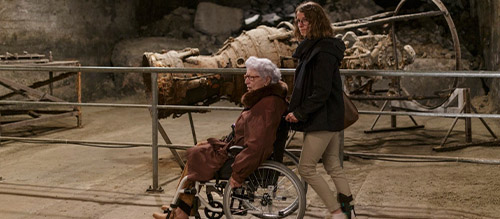Colette (2020) Short Film Review
Colette (2020)
Director: Anthony Giacchino
Subjects: Colette Marin-Catherine, Lucie Fouble
So often, the offerings from the documentary form live and die by their subjects, and in 2021 Documentary Short Subject Oscar nominee Colette, director Anthony Giacchino has found one of the most engrossing subjects imaginable in Colette Marin-Catherine.
A survivor of the Nazi occupation of France during World War II, and the sibling to a young man imprisoned, malnourished and killed in the Nazis’ infamous labour camps, Colette Marin-Catherine is a 75 year survivor, her brother’s portrait on her wall, her demeanour warm but stubborn, vulnerability leaking out of the strong and hard-headed shell she has built over her near century on earth.
Lucie Fouble, a young researcher of the Nazi occupation of France and the evil regime’s inhumane treatment of prisoners, acts as confidant and tour guide to the elderly survivor as Colette, Lucie and director Anthony Giacchino’s team of filmmakers embark on a journey across France and into Germany to visit the places in which Colette’s older brother was imprisoned and where he ultimately died.
Soft spoken and unintimidating, Lucie Fouble forms a close bond with the titular Colette, and as we watch Colette finally visit the locations she insists shouldn’t be made into holiday destinations, and images of the Nazi concentration and labour camps are edited between scenes, the sheer magnitude of Colette’s loss and her inner strength to continue with life becomes undeniable.
Not one to be made a fuss of, we see Colette openly dismiss the idea of “grief vacations” and cut off a German town’s mayor halfway through a speech directed at her so as to save the fuss. She tells of how she and her brother weren’t even close, and how her part in the war as a French child resistance fighter to the Nazi regime was “just something that happened”. We are painted a picture of an immensely strong woman with years of introspection and acceptance that have brought her to this point; so when we see her break down and cry at the remains of a labour camp her brother once stayed in, and she waves away both Lucie and the camera to save anyone seeing her tears or offering her sympathy, there are few moments in film as heart-breaking. “I should have brought flowers. I came all this way and I didn’t even bring anything” she sobs as her bravery is absorbed by the inherent trauma and sadness of living through World War II and losing a brother at such a young age.
Whilst Colette isn’t a film that rewrites the rules of the form or captures a moment as and when it is happening, and while it covers a topic explored time and time again over the decades, the strength of this ultimately personal story and the woman at the heart of it is beautiful, moving and even somewhat poetic modern cinema. There is much to be learned from a woman like Colette, and much to be adored about this Oscar-nominated Documentary short film.
18/24
You can watch Colette in full for free via The Guardian on YouTube.


